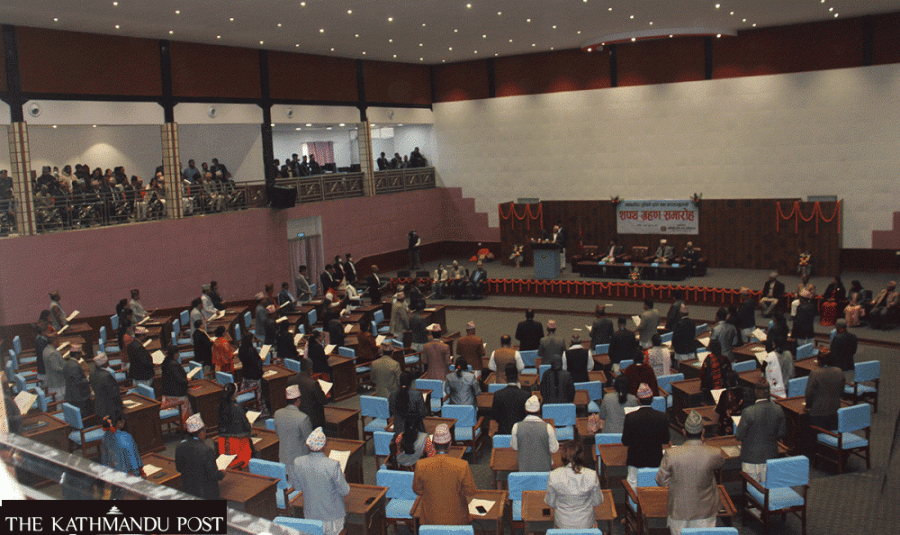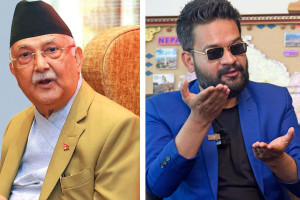Columns
Six years of provincial assemblies
Around 450 laws have been enacted across the seven provinces, but they often look like a replica of federal laws.
Khim Lal Devkota
The 2015 Constitution of Nepal recognises provincial legislative bodies, known as provincial assemblies, as unicameral entities. The province assemblies have twice the number of members elected to the House of Representatives (HoRs) from the respective province through the first-past-the-post (FPTP) electoral system. This number constitutes 60 percent of the assembly, while the remaining 40 percent are elected through the proportional electoral system. Through this methodology, provincial assembly members across the seven provinces total 550; while 330 members are elected through the FPTP electoral system, 220 are elected through the proportional electoral system.
Federal law stipulates that political parties must guarantee representation from diverse demographic sections, groups, and castes—such as women, Dalit, indigenous nationalities, Madhesi, Tharu, Muslims, etc. when selecting candidates for the provincial assembly through the proportional electoral system. Furthermore, the law mandates that at least one-third of the total members elected from each political party representing the provincial assembly must be women.
The first election for the provincial assembly took place on November 26 and December 7, 2017, coinciding with the parliamentary election. The second-term provincial assembly election, alongside the parliamentary election, occurred on November 20, 2022. As the provincial assemblies cross the six-year mark, examining how they have been functioning is pertinent.
Legislative success
In Koshi Province, the provincial assembly comprises 93 members, with 56 elected through the first past the post electoral (FPTP ) system and 37 through proportional representation. The province couldn't finalise its name during the initial five-year term. On March 1, 2023, during the second term, it was officially named 'Koshi Province'. The provincial assembly includes seven parliamentary thematic committees, including the Finance Committee. However, a year into the second term, the parliamentary committees are headless. The provincial assembly formulated 62 bills in this first tenure. According to Gopal Parajuli, secretary of the province, in the first year of the second term, five bills, including those associated with the budget, have been approved. In the first term, the assembly conducted 10 sessions and organised 294 meetings.
In Madhesh, there are 107 members; 64 are elected through the FPTP electoral method and 43 through proportional representation. On January 17, 2022, the assembly named the province Madhesh Province, with Janakpur as the capital. The province assembly operated with seven parliamentary thematic committees, including the Province Affairs Committee. According to Manoj Giri, secretary of the provincial assembly, this province approved 55 bills during its first five-year term. In the first year of the second term, only three budget-related bills have been approved. The assembly conducted nine sessions throughout the first term and held 228 meetings.
In Bagmati, there are 110 provincial assembly members; 66 are elected through the FPTP method and 44 through proportional representation. On January 12, 2020, the assembly officially named the province Bagmati Province, designating Hetauda as its capital. The assembly includes five parliamentary thematic committees, including the Finance and Development Committee. However, despite the fact that it has been over a year since the assembly's formation, the committee president has yet to be elected. Assembly secretary Krishna Hari Khadka says the province issued 70 bills during the first five-year tenure. In the initial year of the second term, eight bills, including those related to the budget, have been approved. The assembly conducted 10 sessions throughout the first term and held 252 meetings.
In Gandaki, there are 60 members; 36 are elected through the FPTP method and 24 through proportional representation. On July 2, 2018, the assembly designated Pokhara as the province's capital, and during the assembly meeting on July 6, 2018, it was named Gandaki province. The assembly functioned with four parliamentary thematic committees, including the Public Accounts Committee. According to Hari Raj Pokhrel, assembly secretary, the province issued 59 bills during the initial five-year tenure. Seven bills, including those related to the budget, have been approved in the first year of the second term. The assembly conducted 10 sessions and held 301 meetings during its first five-year term.
In Lumbini, there are 87 members; 52 are elected through the FPTP method and 35 through proportional representation. On October 6, 2020, the province assembly officially named the province Lumbini Province and designated Deukhuri in Dang as its capital. The assembly includes six parliamentary thematic committees, including the Province Affairs and Law Committee. However, despite more than a year since the formation of the province assembly, the presidents of these committees have yet to be selected.
According to Durlab Kumar Pun Magar, assembly secretary, the assembly approved 72 bills during the initial five-year tenure. Four bills, including those related to the budget, have been approved in the first year of the second term. The assembly conducted 10 sessions throughout the first term and held 209 meetings.
In Karnali, there are 40 province assembly members; 24 were elected through the FPTP method and 16 through proportional representation. On February 24, 2018, the province assembly officially named the province Karnali Province and designated Surkhet as its capital. The assembly operated with four parliamentary thematic committees, including the Province Affairs Committee. According to assembly secretary Jivraj Budhathoki, during the initial five-year tenure, the province issued 53 bills. Only four bills, including budget-related ones, were approved in the first year of the second term. The assembly conducted 10 sessions throughout the first term and held 217 meetings.
In Sudhurpaschim, there are 53 province assembly members; 32 are elected through the FPTP method and 21 through proportional representation. On September 28, 2018, the province assembly officially named the province Sudurpaschim Province and designated Godavari as its capital. The assembly functioned with four parliamentary thematic committees, including the Legislative and Provincial Affairs Committees. However, despite more than a year since the formation of the province assembly, the committee presidents have yet to be elected. According to assembly secretary Dev Bahadur Bogati, during the initial five-year tenure, this province approved 67 bills. Four bills, including those related to the budget, have been approved in the first year of the second term. The province assembly conducted 10 sessions and held 262 meetings during its first term.
The primary role of provincial assemblies is crafting laws and ensuring accountability of the provincial government to its citizens. Over the past five years, approximately 450 laws have been enacted across the seven provinces. However, these legislations reflect a rush to establish laws under the new constitutional mandate, resulting in some being replicas of federal laws and lacking prioritisation.
Significantly, some of these laws remain unimplemented, attributing to the provincial governments' reliance on the central leadership. This dependence has limited the effectiveness of provinces in decision-making, exemplified by inactive parliamentary committees in a few provinces. Provincial assemblies and governments have encountered numerous internal and external challenges hindering their progress. It's vital for them to operate with the conviction that heightened activity and efficiency lead to amplified visibility and accountability to the people they serve in achieving their goals.




 10.12°C Kathmandu
10.12°C Kathmandu















